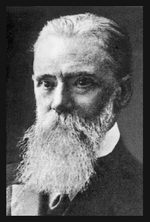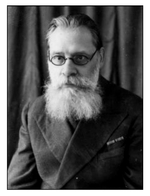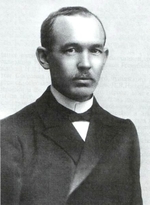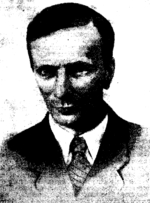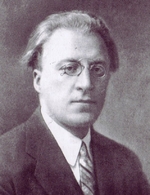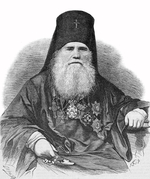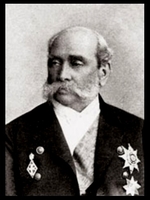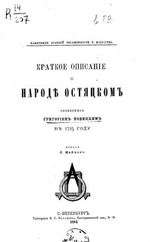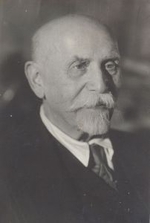Articles
Nickolsky Mikhail (1848–1917)
Nickolsky Mikhail (1848–1917) – orientalist (specialist in Assyriology and Semitology), the founder of Russian Assyriology.
He graduated from the Moscow Spiritual Academy, where he learnt Hebrew and classical languages; he learnt Assyriology by himself, later learnt Phoenician, Aramaic, and Arabic languages – also by himself. He worked, at first, as corrector; later – as teacher of Greek in gymnasia of Moscow. His first publications appeared in late 1870-s, in popular magazines (‘Russkyi vestnik’, ‘Zagranuchyi vestnik’), and in ‘Pravoslavnoe obozrenie’. In 1880, in the course of studying a cuneiform tablets collection, he found the most ancient proto-Sumerian pictograms and demonstrated the evolution cuneiform writing from pictorial signs. At the same time, he offered a method of detection of fakes in Assyriology. In the early 1880-s, he taught Assyriology and Semitology at the Moscow University.
Read More
Nickolsky Nickolay (1877–1959)
Nickolsky Nickolay (1877–1959) – historian of religion, orientalist, specialist in Biblical studies.
He was born in the family of M. V. Nickolsky, founder of Russian Asyyriology. In 1896, he finished gymnasium with the golden medal and enrolled to the Historical and Philological Faculty of the Moscow University. His Diploma theme ‘Judea under the Maccabees and the Hasmonean Dynasty’ shaped his further interest to the Ancient East and Biblical Studies. He graduated from the University in 1900, taught history in the private female gymnasium of O. F. Protopopova till 1919. In the period of the Revolution 1905-1907, he was close to Social Democrats, participated in their newspapers ‘Bor’ba’ (Struggle), ‘Svetoch’ (Torch), ‘Svobodnoe slovo’ (Free Word) – wrote under the pseudonym Z. Antonov; he also provided space for meetings of the Moscow Committee of the R.S.D.W.P. in his flat.
Read More
Nickolsky Nickolay (1878–1961)
Nickolsky Nickolay (1878–1961) – ethnographer and folklorist, in the revolutionary years – social activist.
In 1899-1903, he studied at the Kazan’ Spiritual Seminary, that taught at the Kazan’ Aboriginal Spiritual Seminary. He was the first Chuvash, who got the research degree of mater: his Master thesis was ‘Christianity among the Chuvash People of the Middle Volga Region in the Sixteenth – Seventeenth Centuries: Historical Survey’ (1913). In 1915-1917, he was Ass. Docent of the Kazan’ University (course: History of Christian Enlightening of the Aborigines of the Volga Region). In 1917, in Kazan’, he organized the Society of Small Peoples of the Volga Region, and the first newspaper in Chuvash language – ‘Hypar’. (he was the Chief Editor of its first 22 issues). He was known as musician and healer. Professor of the Kazan’ University (1918-1922); Professor of the Eastern Teachers-Training Institute (1922-1931).
Read More
Nickolsky Vladimir (1894–1953)
Nickolsky Vladimir (1894–1953) – historian, ethnologist, specialist in religious studies, Doctor in History (1944).
In 1916, he graduated from the Historical and Philological Faculty of the Moscow University, where his supervisor was M. C. Liubavsky. He stayed at the university to prepare himself for a position of Professor. In 1918-1925, he taught at the Faculty of Social Studies; in 1925-1930 – at the Ethnological Faculty; since 1934 – at the Historical Faculty (he headed the Commission on the History of the Pre-Class Society at the Chair of the History of the Ancient World); also he was Prof. of the Chair of Ancient History at the Moscow Institute of Philosophy, Literature and History. In 1942-1953, he was Head of the Chair of Ancient History of the Moscow Regional Teachers-Training Institute, and Prof. at the Chair of the World History at the Moscow State Historical-Archival Institute.
Read More
Nikiforov Aleksander (1893–1942)
Nikiforov Aleksander (1893–1942) – philologist and ethnographer.
In 1917, he graduated from the Petrograd University, studied Old Russian monuments. Since 1919, he led special practical classes in philological disciplines at the Kazan’ High Teachers-Training Institute. In the second half of 1920-s, N. participated in a complex research expedition along the rivers of the Russian North and fixed texts of local folk tales. In 1922-1930, he worked in Leningrad – at the Research Institute of Comparative Studying of Literatures and Languages of West and East at the Leningrad State University, at the Tolstoy Museum, at the Institute of Art History, at the Institute of Speech Culture. In 1930-1936, he taught at the Leningrad Indestrial Academy. In 1936-1938, he was Professor of the Leningrad Herzen Teachers-Training Institute; and in 1936-1942 – also at the Leningrad Pokrovsky Teachers-Training Institute, where he had classes in folklore, Old Russian literature, Old Slavic paleography. On May 28, 1941, he defended his Doctor thesis in Philology ‘Tale of the Prince Igor’s Campaign – a Fable of the Twelfth Century’ at the Leningrad State University.
He died in the Blockade of Leningrad in 1942.
Read More
Nikolsky Pavel (1870‒1942/43)
Nikolsky Pavel (1870‒1942/43) – ecclesiastic historian, social activist. He was born in the family of a deacon.
After an ecclesiastic school, he graduated from the Tambov Ecclesiastic Seminary at the first rank (1890), and the Kazan Ecclesiastic Academy (1894) with a degree of Candidate in Theology. His Master thesis was ‘The History of the Voronezh Ecclesiastic Seminary’ (1900, Kazan Ecclesiastic Academy).
He taught ecclesiastic and biblical history at the Voronezh Ecclesiastic Seminary; since 1904, he has worked as inspector of church schools from the name of the Voronezh eparchy. He was a member of the regional statistic committee, one of the founders of the Scholarly archive commission; since 1901, he has worked at the Ecclesiastic Historical and Archaeological Committee. Since 1915, he has been Director of people’s schools of the Saratov Region. He got the rank of the State Council.
Read More
Nilus Archbishop (Nickolay Isakovich) (1799–1874)
Nilus Archbishop (Nickolay Isakovich) (1799–1874) – archpriest of Russian Orthodox Church, missionary, translator, specialist in Buddhism.
He graduated from the St. Petersburg Spiritual Academy; in 1838-1853, he served as Archbishop of the Irkutsk Eparchy – from Yenissei to the Pacific Ocean. He made thirteen missionary travels to Yakutian and Buryatia. He was Honourary Member of the Universities of St. Petersburg and Kazan’. And was a prototype for a character of the novel ‘At the Edge of the World’ by N. S. Leskov.
Read More
Novikov Eugeny (1826–1903)
Novikov Eugeny (1826–1903) – historian, diplomat.
In 1846, he graduated from the Historical and Philological Faculty of the Moscow University. In 1850, he started his service at the Asian Department of the Ministry of Foreign Affairs; in 1860, he was transferred to the European Commission in Syria. In 1865-1870, he was Extraordinary Envoy and Plenipotentiary Minister in Greece; in 1870-1874 – at the same position in Austro-Hungary
Initially, he was interested in the Hussites Movement; he argues for the Orthodox essence of the ideas of Jan Hus. He tried to explain it with the St Cyril and Methodius tradition as if kept in Czech society in spite of the obvious victory of Catholicism.
Read More
Novitsky Grigory (? - 1720)
Novitsky Grigory (? - 1720) – ukrainian Cossack, ethnographer.
He was from a noble Ukrainian family, studied at the Kievan Mogilyanskaya Academy. For his participation in the Masepa revolt he was sent to exile to Siberia. In 1712-1715, he participated in missionary expeditions of Metropolitan Philopheus (Leshchinsky) to the low tide of the Ob’ River for Christening local Khanty (Ostyak) and Mansi (Vogul).
In 1715, on the base of those expeditions, N. wrote the first ethnographic work in Russian language: ‘Short Description on the People of Ostyaks, Their Life, Habits… Their Former Evil Idolatry, and their Conversion into Orthodox Pious Christian Faith’ (publ. by L. Maikov in St. Petersburg in 1884).
Read More
Novosadsky Nickolay (1859–1941)
Novosadsky Nickolay (1859–1941) – specialist in classical philology, epigraphy and classical religion.
After classical gymnasium in Izyaslav, he enrolled at the St. Petersburg Historical and Philological Institute and graduated from it in 1883. In 1883-1884, he worked as teacher of classical languages at the male gymnasium in Taganrog.
In 1884-1886, he was sent for two years to Greece to prepare himself for a position of Professor; then he taught classical languages in St. Petersburg – at the private Widemann’s Gymnasium (1886-1888), and at the Historical and Philological Institute (1887-1888).
In 1887, he got his Master degree in Greek literature at the St. Petersburg University for his thesis ‘Eleusinian Mysteries’.
Read More
Showing 191-200 of 351 items.

